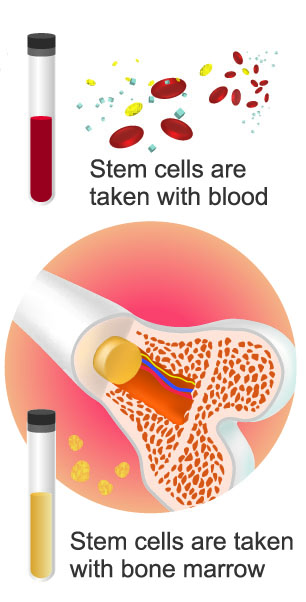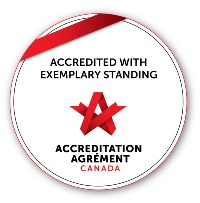Manitoba Blood & Marrow Transplant Program
Blood & Marrow Transplant Registry
2140B-675 McDermot Ave
Winnipeg, Manitoba R3E 0V9
Phone: 204-787-1596
Fax: 204-787-1609
Blood & Marrow transplantation is a medical procedure used to treat diseases once thought to be incurable. Stem cells are taken from either the patient living with cancer (autologous), from a living donor (allogeneic) or an identical twin donor (syngeneic). Chemotherapy is given to the patient to destroy as many cancer cells as possible. The stem cells are then transplanted back into the patient, allowing healthy blood cells to grow, new blood cells to form and boosting the patient’s defense against infection.
Transplants have been used worldwide to treat patients diagnosed with leukemia, aplastic anemias, lymphomas, multiple myeloma, immune deficiency disorders, and some solid tumors.
Given the complexity of the transplant patient population, ongoing critical review of transplant outcomes is essential to improve transplant results. Data on all transplants performed at our center is collected for the Manitoba Blood & Marrow Transplant (MBMT) Program & various transplant registries for this purpose.

To co-ordinate, collect, and assist in the appropriate dissemination of all pertinent transplant data for the MBMT Program. We ensure that necessary data for clinical and research purposes is collected, prepared, and analyzed according to program and registry requirements.
Data collected is used for various purposes:
- Program Quality Assurance
- Statistics
- MBMT Program, Facility, and Provincial Reporting
- International and Worldwide Transplant Analysis
The Manitoba Blood & Marrow Transplant (MBMT) Program is a member of various transplant registries. Transplant registries act as a "pooling center" for data submitted by numerous worldwide transplant centers. The data is collected according to standards set by each registry, allowing for the compilation and comparing of transplant data to identify ways to improve transplant outcomes on a worldwide basis.
Generic, unidentifiable transplant data is submitted by us to the following registries:
- International Bone Marrow Transplant Registry/Autologous Blood & Marrow Transplant Registry (IBMTR/ABMTR)
Since 1972 the IBMTR has collected and analyzed outcome data from over 450 transplant centers worldwide.
The IBMTR is a voluntary organization collaborating with numerous transplant centers to address important issues in blood and marrow transplantation in all patient populations and groups.
- Pediatric Blood & Marrow Transplant Consortium (PBMTC)
Since 1990 the PBMTC has collected information from 77 centers throughout the USA, Canada, and Australia.
The consortium's focus is on transplant data from patients less than 22 years of age, to improve transplant outcomes in a specific and specialized patient population - young children and adults.
- Canadian Blood & Marrow Transplant Group (CBMTG)
The CBMTG is a national, voluntary organization providing leadership and promoting excellence in patient care and education in the field of blood and marrow transplant.
Transplant information is collected at specific intervals throughout the transplant course. The type of data collected is determined by the various registries that set reporting standards.
Data provides physicians with the ability to look at factors affecting transplant outcomes, morbidity, and mortality, thus allowing for continual improvement in transplant outcomes and patient care.
Data kept for analysis includes points such as the disease classification and status, pre-transplant therapies received the type of transplant, donor type, post-transplant complications, graft versus host disease, response to transplant, and quality of life.
OneMatch Stem Cell and Marrow Network are responsible for finding and matching volunteer donors to patients who require stem cell transplants. You cannot be tested specifically for a relative or friend. The website contains information about the registration and donation process.
You may be eligible to join if you are between 17 and 35 years old and meet certain health criteria.
You can join OneMatch by calling toll-free 1-888-2 DONATE or by visiting their website www.onematch.ca
OneMatch is a member of an international network of registries with more than 20 million donors worldwide. By agreeing to make their donor data available worldwide, international registries have significantly increased the odds of being able to find a matching donor for any patient, anywhere in the world.

